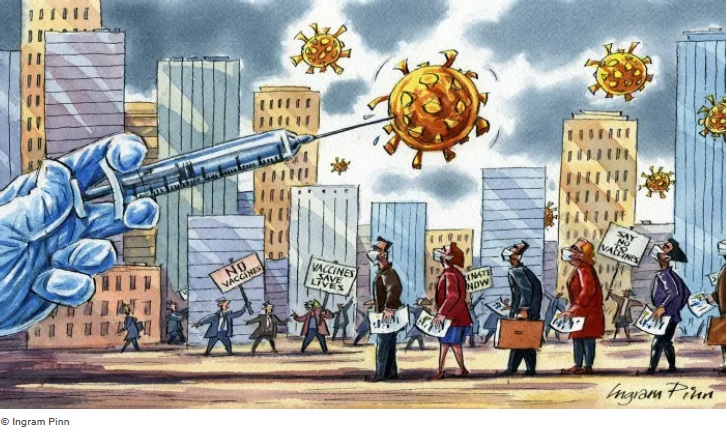This op-ed by Dr. Scott Ratzan was originally published in the Financial Times on December 4, 2020.
One day early next year, you may well turn on your smartphone and see the following message, or one like it, from the company that you work for. What would go through your mind after you read it?
SUBJECT: Covid-19 vaccination
Dear valued colleague:
We are pleased that our human resources team has secured doses of the new Covid-19 vaccine and it will be free for all employees. An appointment has been made for you to receive the first ofyour two vaccine shots in the cafeteria at 9AM on Wednesday. Please be prompt, wear your mask and keep your distancing in the queue. A successful vaccination drive is key to our return to amore normal life and workplace!
Cordially,
John Cooper, CEO
Suppose you actually did get an email like that, or that you were even responsible for sending it?Coronavirus has tested everyone’s resolve this year. Now, with the UK’s regulatory approval this week of one of the new vaccines, an end to the pandemic is in sight. Yet many people — including even doctors, nurses and people who have taken flu jabs and vaccinated their children against polioand measles — have said that they are reluctant to take a vaccine that has been developed soquickly, and in such a politically charged environment.
Their reluctance is just the latest manifestation of the communication chaos that has surrounded Covid-19 from the start. Common questions used to be along the lines of: should I wear a mask? How much is “social distance”? Does hydroxychloroquine cure Covid-19? What about bleach?
Soon, though, those questions will change. Instead they will be along the lines of: does the vaccinework? Is it safe? Are there enough doses? Do I need one or two jabs? Should I take the first vaccinethat becomes available, or wait for the next one?
To help bring the pandemic to a close, business has a central role to play in helping people answersuch questions satisfactorily. In fact, as a doctor who specialises in public health communicationand advises the US National Academy of Medicine, my message to business is that you can beoptimistic about the efficacy of Covid-19 vaccines. But you also need to develop systematic plans tovaccinate employees.
The aim should be to instill confidence among your work colleagues and their families — and thuscustomers, supply chain companies and the general public too — that community protection against the virus, otherwise known as herd immunity, is achievable. Assuming the vaccine is over 90 per cent effective, I estimate that with a roughly 80 per cent uptake among employees and their families in a given community the minimal level of coverage required to bring the virus under control would be achieved by September 2021.
How to get there, though? It will not be easy. At Business Partners to CONVINCE, a vaccine confidence initiative led by the US Council for International Business with US and European universities as collaborators, we surveyed more than 13,000 people in 19 countries. Unfortunately, we found that in countries such as the UK, France and the US nearly a third expressed no interest in taking a vaccine. Other studies have had similarly ominous results.
Trillions of dollars have already been spent combating the virus and supporting people and businesses through the pandemic. To return to a more normal economy, and to avoid spending trillions of dollars more, businesses now have to integrate Covid-19 vaccination into their plans.
This should include vaccine targets and staff timetables, with dedicated resources. Many employment lawyers argue against compulsory vaccination as the potential legal risk of vaccine failure, though very small, is not nil. Voluntarism and gentle persuasion with simple incentives such as gift certificates should help to encourage hesitant staff. Interactive employee chats with medical experts, or union leaders where appropriate, could also allay concerns. To achieve workforce immunisation, commitment from top personnel will be essential.
Business leaders also have an important role to play in advancing vaccine literacy and uptake in wider society. Educational programmes for employees can help disperse the knowledge needed to convince other community members to willingly accept vaccination. Businesses should also advocate for healthcare systems that can meet vaccine demand, plus more investment in digital health communications to support vaccine coverage as a social norm globally. Many companies, such as IBM and Salesforce, are already working towards this. More are needed.
Back to that initial email, and your reaction to it. Do you currently have enough information to go and get the jab willingly? Would you be first in line? Or would you want to ask your doctor, your immediate supervisor or your friends for more information? Perhaps you would turn to the internet first?
The stakes are high and the situation could not be more serious. Our society, our economy and our own lives are at stake. But if business does the job it could do, such questions should largely be redundant as they will have already been answered. The goal — and let’s not forget that it is achievable if the right efforts are made — is a vaccine-protected world by this time next year.
